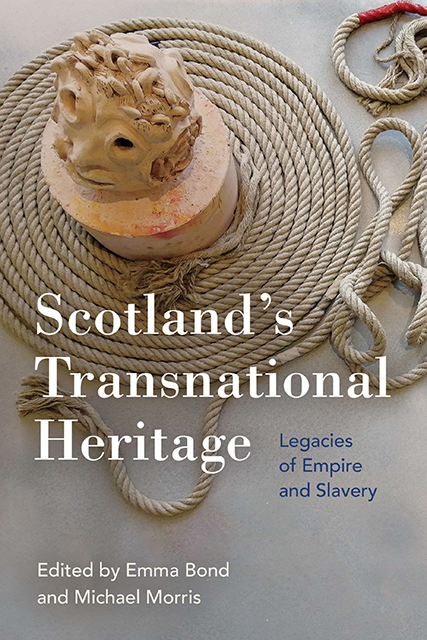Book contents
- Frontmatter
- Contents
- List of Figures
- Notes on Contributors
- Acknowledgements
- Foreword: Fostering Recognition under the Luxury of Amnesia
- Chapter 1 An Introduction to Scotland’s Transnational Heritage: Sites, Things and Time(s)
- Part I Transnational Sites
- Part II Transnational Things
- Part III Transnational Time(s)
- Afterword: Building Solidarity: Moving Towards the Repatriation of the House of Ni’isjoohl Totem Pole
- Index
Foreword: Fostering Recognition under the Luxury of Amnesia
Published online by Cambridge University Press: 25 October 2023
- Frontmatter
- Contents
- List of Figures
- Notes on Contributors
- Acknowledgements
- Foreword: Fostering Recognition under the Luxury of Amnesia
- Chapter 1 An Introduction to Scotland’s Transnational Heritage: Sites, Things and Time(s)
- Part I Transnational Sites
- Part II Transnational Things
- Part III Transnational Time(s)
- Afterword: Building Solidarity: Moving Towards the Repatriation of the House of Ni’isjoohl Totem Pole
- Index
Summary
How do we decide which stories to tell?
Walking through Edinburgh as a young student, I searched for images and stories that spoke of my experience and my culture. Hidden beneath the façade of good manners and blank stares, museum and gallery staff often looked at me like I was an alien. My face turned into a question mark and in turn they were ellipses.
The gift of storytelling often lies with the raconteur. How do they demonstrate nuance, close focus, create pace and – of course – leave the audience wanting more? If we imagine our museums, galleries and national heritage collections as storytellers, what stories are they choosing to tell us? What connections are made and what is understood or made legible in these stories? How do they keep us curious? Who are the protagonists and who lies in the shadows?
Scotland’s Transnational Heritage: Legacies of Empire and Slavery conveys an extensive survey of research that seeks to attend to significant and systematic obfuscations of racialised trauma that have lain buried under more palatable narratives. Here the storytellers actively intervene, activate and rupture traditional stories of benevolent coloniality through examining transnational relationships bound by trade in objects, people and routes. Distinctions of focus for many of the researchers respond and question the traditional matrices of categorisations that are structured around colonial ideologies reliant on biased identifications in vast systems of separation, rejection and recognition. Instead, their explorations of anti-colonial politics here are nuanced and suggest a myriad of perspectives to examine issues such as erasure, accessibility, restrictions, permissions, representation, history, collective memory and racialised trauma. By communicating the complexity of the different research projects, Scotland’s Transnational Heritage makes a vital contribution by spotlighting what Scottish heritage collections have chosen to obfuscate and the sleight of hand in the accepted stories once readily told.
I remember myself as a young Caribbean-Scot walking through those Scottish museums and galleries, and the feeling that someone had played a trick on me still haunts me. The harsh but undeniable truths of miscegenation and colonial kinships that birthed the British Empire and enriched Scotland were unforgettable in Barbados.
- Type
- Chapter
- Information
- Scotland's Transnational HeritageLegacies of Empire and Slavery, pp. xv - xviPublisher: Edinburgh University PressPrint publication year: 2023



